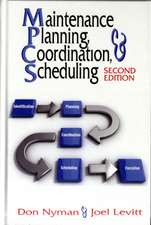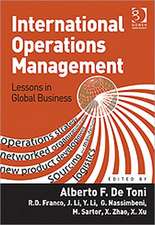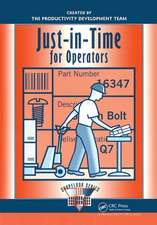Organizing Cross-Functional New Product Development Projects: The Phase-Specific Effects of Organizational Antecedents
Autor Tobias Huth Cuvânt înainte de Joachim Büschkenen Limba Engleză Paperback – 24 ian 2008
Preț: 381.98 lei
Nou
Puncte Express: 573
Preț estimativ în valută:
73.10€ • 79.38$ • 61.40£
73.10€ • 79.38$ • 61.40£
Carte tipărită la comandă
Livrare economică 22 aprilie-06 mai
Preluare comenzi: 021 569.72.76
Specificații
ISBN-13: 9783835009264
ISBN-10: 3835009265
Pagini: 185
Ilustrații: XVII, 185 p.
Dimensiuni: 148 x 210 x 13 mm
Greutate: 0.27 kg
Ediția:2008
Editura: Gabler Verlag
Colecția Gabler Verlag
Locul publicării:Wiesbaden, Germany
ISBN-10: 3835009265
Pagini: 185
Ilustrații: XVII, 185 p.
Dimensiuni: 148 x 210 x 13 mm
Greutate: 0.27 kg
Ediția:2008
Editura: Gabler Verlag
Colecția Gabler Verlag
Locul publicării:Wiesbaden, Germany
Public țintă
ResearchCuprins
Cross-Functional Teams in New Product Development.- Theoretical Framework for the Phase-specific Effects of Organizational Antecedents in Cross-Functional New Product Development.- Research Methodology and Results.- Discussion.- References.
Notă biografică
Dr. Tobias Huth promovierte bei Prof. Dr. Joachim Büschken am Lehrstuhl für Marketing und Absatzwirtschaft an der Katholischen Universität Eichstätt-Ingolstadt. Er ist als Manager Business Evaluation bei der BASF AG in Ludwigshafen tätig.
Textul de pe ultima copertă
Companies are looking for better ways to develop innovative products. In this regard, cross-functional teams (CFTs) are considered to be a key success factor. However, previous research indicates that the use of CFTs does not automatically lead to successful innovation. It appears that the employment of CFTs has to be implemented as systematically as well as other organizational activities.
On the basis of a survey conducted with 133 project managers, Tobias Huth presents an empirical analysis of the organizational success drivers of new cross-functional product development projects. The investigated antecedents are distinguished by organic and mechanistic designs as well as boundary spanning activities. New territory is entered by applying a phase-specific perspective. It is shown that certain antecedents (e.g. participative decision-making, top management support) should be permanently employed, while others (e.g. steering committees, central budgets) should be managed dynamically. Teams are advised to adopt a dynamic blend of flexibility and discipline while constantly interacting with external sources inside the organization.
On the basis of a survey conducted with 133 project managers, Tobias Huth presents an empirical analysis of the organizational success drivers of new cross-functional product development projects. The investigated antecedents are distinguished by organic and mechanistic designs as well as boundary spanning activities. New territory is entered by applying a phase-specific perspective. It is shown that certain antecedents (e.g. participative decision-making, top management support) should be permanently employed, while others (e.g. steering committees, central budgets) should be managed dynamically. Teams are advised to adopt a dynamic blend of flexibility and discipline while constantly interacting with external sources inside the organization.











